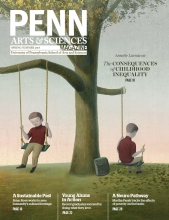“I didn’t want to write a book that anyone else would write,” says Associate Professor of English Paul K. Saint-Amour. Scholarship and personal history coalesce in his latest project, Future Tense: Modernism, Total War, and Encyclopedic Form.
Saint-Amour studies modernist literature with a particular focus on the period between the first and second World Wars, known as the interwar period. His current book zeros in on literature from the 1920s. Though this era is known as “roaring” and “golden,” Tense Future finds it overshadowed by past and future conflict. “World War I was the first global conflict in which cities were bombed from the air,” says Saint-Amour. “That experience produced traumatic memories, but it also provoked terror and dire speculation about the next big war, which seemed likely to take far more civilian lives.”
In Tense Future Saint-Amour describes a “collective psychosis” of anticipation whose traces can be found in a range of interwar writing. Other scholars have written about traumatizing anticipation in the Cold War, especially at moments like the Cuban Missile Crisis, but Saint-Amour argues that aspects of the nuclear condition—the concern about how nuclear arms affect international politics and the human condition—started appearing in literature much earlier, right after World War I. “Seeing hints of something like a nuclear syndrome in the ‘20s gives us a continuity across 1945, a year we tend to see as an absolute break between the pre- and post-nuclear world,” he says.
Tense Future reevaluates a collection of interwar writers who didn’t write explicitly about war, and shows they were not only writing in the shadow of war, but with the specter of total war, which sees both soldiers and civilians as legitimate targets. Saint-Amour says James Joyce’s Ulysses is a well-known example of a novel that responded to total war without being “about” war.
“Joyce boasted that he had put so much of Dublin into Ulysses that if the city vanished it could be rebuilt out of his book,” says Saint-Amour. “I’m interested in the boast, which turns the novel into a world-portrait that’s not sponsored by war. I’m also interested in the ominous premise of the boast: the disappearance of a city, something that could happen with a new suddenness and severity in the twentieth century.”
Ultimately Saint-Amour’s own life experience frames Tense Future. His mother survived the attack on Pearl Harbor in a bomb shelter in Honolulu when she was two months old. As a teenager in the ‘80s, Saint-Amour became obsessed enough with impending nuclear doom to become active in the disarmament movement. And now, as a father, he must help his children grapple with the prospect of a future altered by climate change.
But writing is its own kind of shelter. For Saint-Amour, any big research project becomes a place to inhabit, where personal affect and memory can mortar scholarly ideas together. “The scholarly books that have meant the most to me were clearly like that for the writer,” Saint-Amour says. “They were houses that the writer had been living in for a while and probably couldn’t ever fully abandon.”



